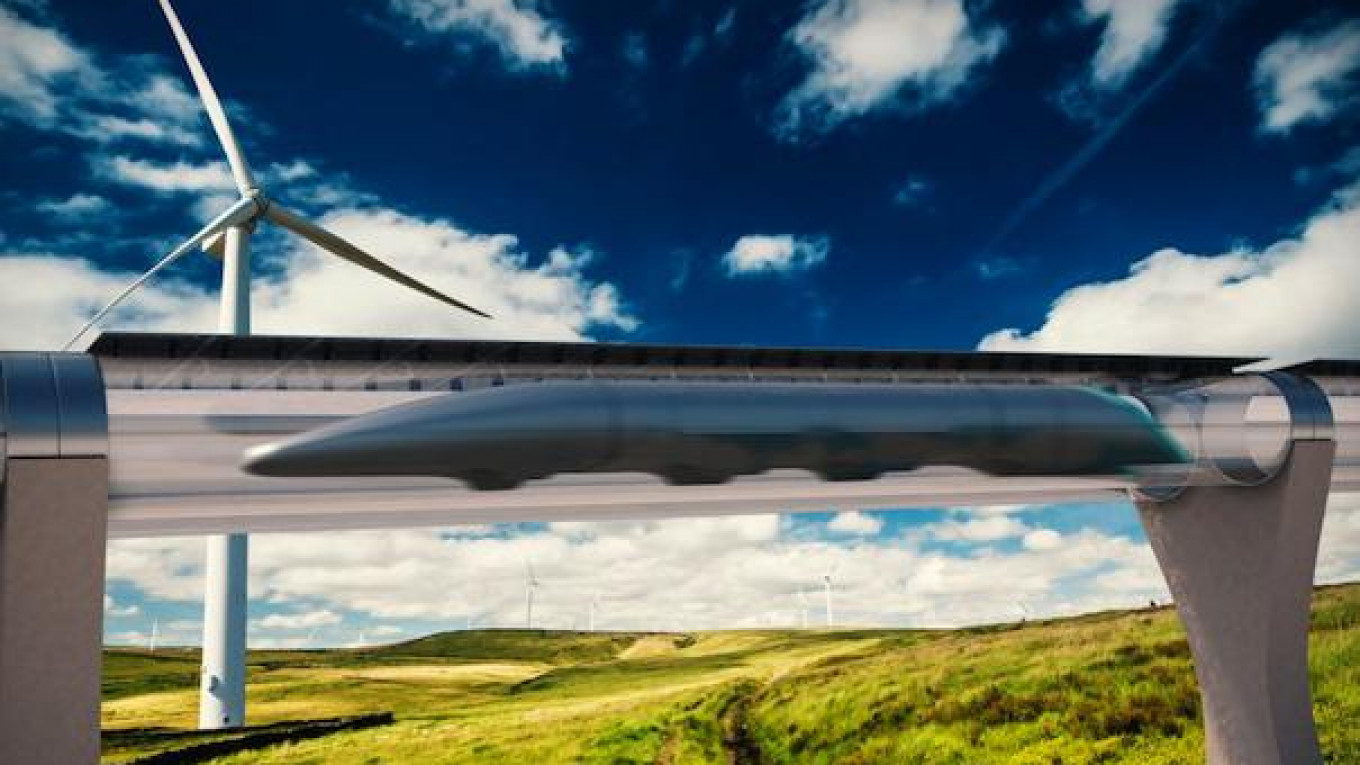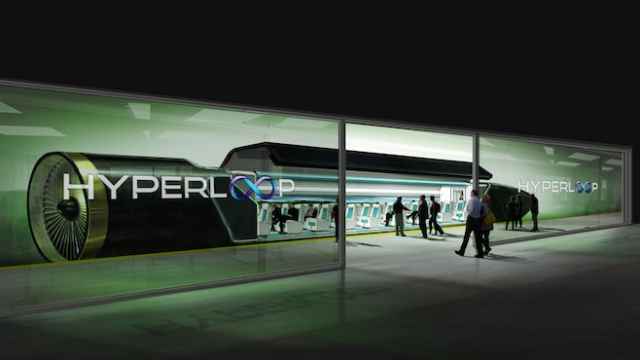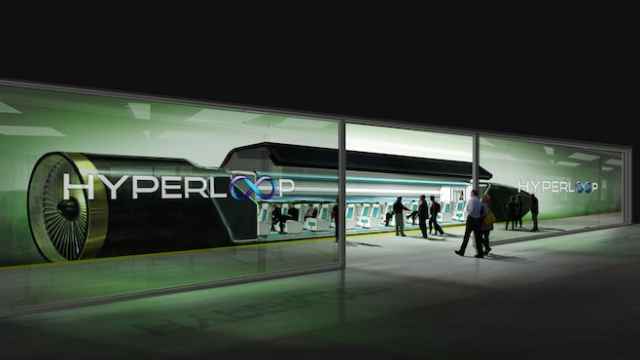In mid June, Shervin Pishevar, co-founder of Hyperloop One, sat under the high, decorated ceiling of a palace in St. Petersburg.
Men in suits lined the large, rectangular table. “Eighteen heads of sovereign [wealth] funds and President [Vladimir] Putin. $10 trillion in the room,” Pishevar wrote alongside a photo posted on Facebook. “Then Putin called on me.”
So Pishevar, a burly, bearded Silicon Valley entrepreneur, began to speak. He talked about the Hyperloop trains his company plans to build: Transportation pods levitated by magnets inside an airless tube that could travel at speeds 300 kilometers per hour faster than a passenger aircraft, thanks to the low air resistance. Pods that could whisk goods through Russia from China to Europe in the space of hours, or turn St. Petersburg into a suburb of Moscow.
Putin listened attentively. Then, according to Pishevar, he said, “Hyperloop will fundamentally change the global economy.”
By the time Pishevar left Russia, Hyperloop One had signed its first deal with a foreign government, a partnership with Moscow’s City Hall. It had also been asked by Russia’s transport minister to design a 70-kilometer Hyperloop track in the Russian Far East.
With that kind of support, perhaps the first Hyperloop won’t be built in California, but in Russia.
Dreaming of Innovation
At first sight, all that seems strange. Russia, after all, is suffering its deepest economic crisis for nearly two decades. Much of its infrastructure is hopelessly backward. It is a country in which passengers in slippers shuffle between bunk beds in overnight trains that travel at average speeds of just over 50 kilometers an hour. Freight trains, meanwhile, move at a little over 10 kilometers per hour.
But there are a few things working in Hyperloop’s favor.
First, innovation has once again become a buzzword in government. Officials are, at least in theory, keen to diversify away from the oil and gas industry on which the country currently relies. And they are paranoid that Russia could fall so far behind the technological innovation happening elsewhere that it will never catch up.
That fear has sprouted strategic plans for major infrastructure investment and research into the technology of the future. These plans think big: On the agenda are things like quantum computing, neural interfaces and teleportation. Hyperloop, with its science-fiction-movie tube trains, fits perfectly into that vision.
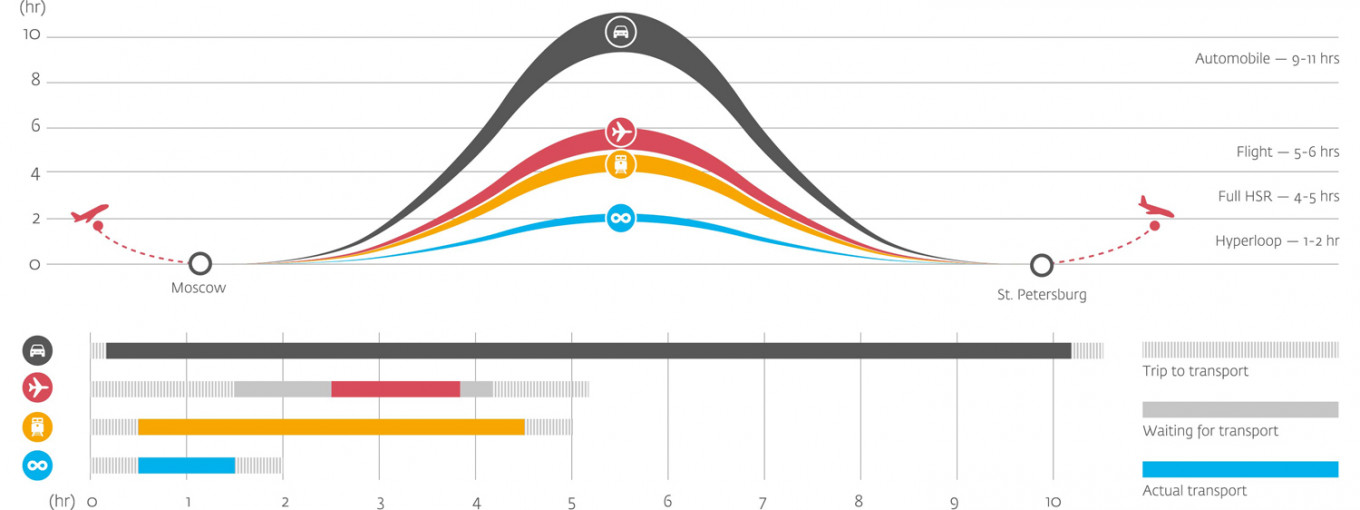
Second, Hyperloop has a powerful Russian investor lobbying its interests, a Dagestani tycoon called Ziyavudin Magomedov.
Tall, handsome and worth $900 million, Magomedov is a true techie. According to Forbes, for his 47th birthday party last year, he hosted a robot-themed ball and gifted each guest a book about Elon Musk, the billionaire inventor who in 2013 launched the Hyperloop concept.
Like Putin, he is emphatically excited about the idea. “It will kill truck and air transportation at a minimum,” he told Forbes.
Magomedov is also supremely well connected. His investment company, Summa Group, spans businesses from real estate to logistics and has handled orders from state companies worth billions of dollars. He has advised the president and allegedly paid for Putin’s press secretary to honeymoon last year on a super yacht in the Mediterranean. One of Russia’s deputy prime minsters, Arkady Dvorkovich, is an old university friend and, conveniently, oversees the country’s policy on transport, innovation and industry policy, though the two deny any favoritism.
Magomedov invested in Hyperloop One through his $300 million venture capital fund, Caspian VC Partners, and set about bringing it to Russia. Bill Shor, the Russian-speaking American who runs Caspian for him, describes him as “very hands on.”
Magomedov has played the role of Hyperloop One’s deal broker. His Summa Group was a co-signatory on the agreement between Hyperloop One and the Moscow Government, which will create a working group aimed at fitting Hyperloop technology into Moscow’s transport system.
He likely also played a major role in pushing for a Hyperloop to span the 70 kilometers between the Chinese industrial center of Jilin and Zarubino, south of Russia’s Vladivostok, where Summa is investing in port facilities.
Both projects have been billed as revolutionary. In heavily congested Moscow, which is currently ploughing huge sums into expanding its transport infrastructure, Hyperloop One says its technology could potentially “give capital region commuters weeks of their lives back.”
The link with Jilin, meanwhile, would carry 10 million tons of cargo a year, zipping containers to port in minutes, says Russian Transport Minister Maxim Sokolov. He wants Hyperloop One to present a design for the track at an investment forum in Vladivostok in September.
Tapping Into China
The third thing playing in Hyperloop’s favor in Russia is that it could unlock vast amounts of Chinese investment.
The Jilin-Zarubino spur is just the beginning. In the longer term, Hyperloop could create “the heart of the transport infrastructure for the Eurasian landmass,” says Shor. The technology will likely be used for freight before it begins to transport passengers. And the route between China and Europe is one of the world’s busiest trade arteries.
The distance between China’s eastern edge and Central Europe is some 7,000 kilometers. Freight currently navigates that distance by train in around three weeks and by sea in roughly two months. In theory, a Hyperloop could span it in six hours.
Beijing has committed tens of billions of dollars to its “One Belt-One Road” plan to create new infrastructure between it and Europe. Russian authorities have their eyes on some of that money.
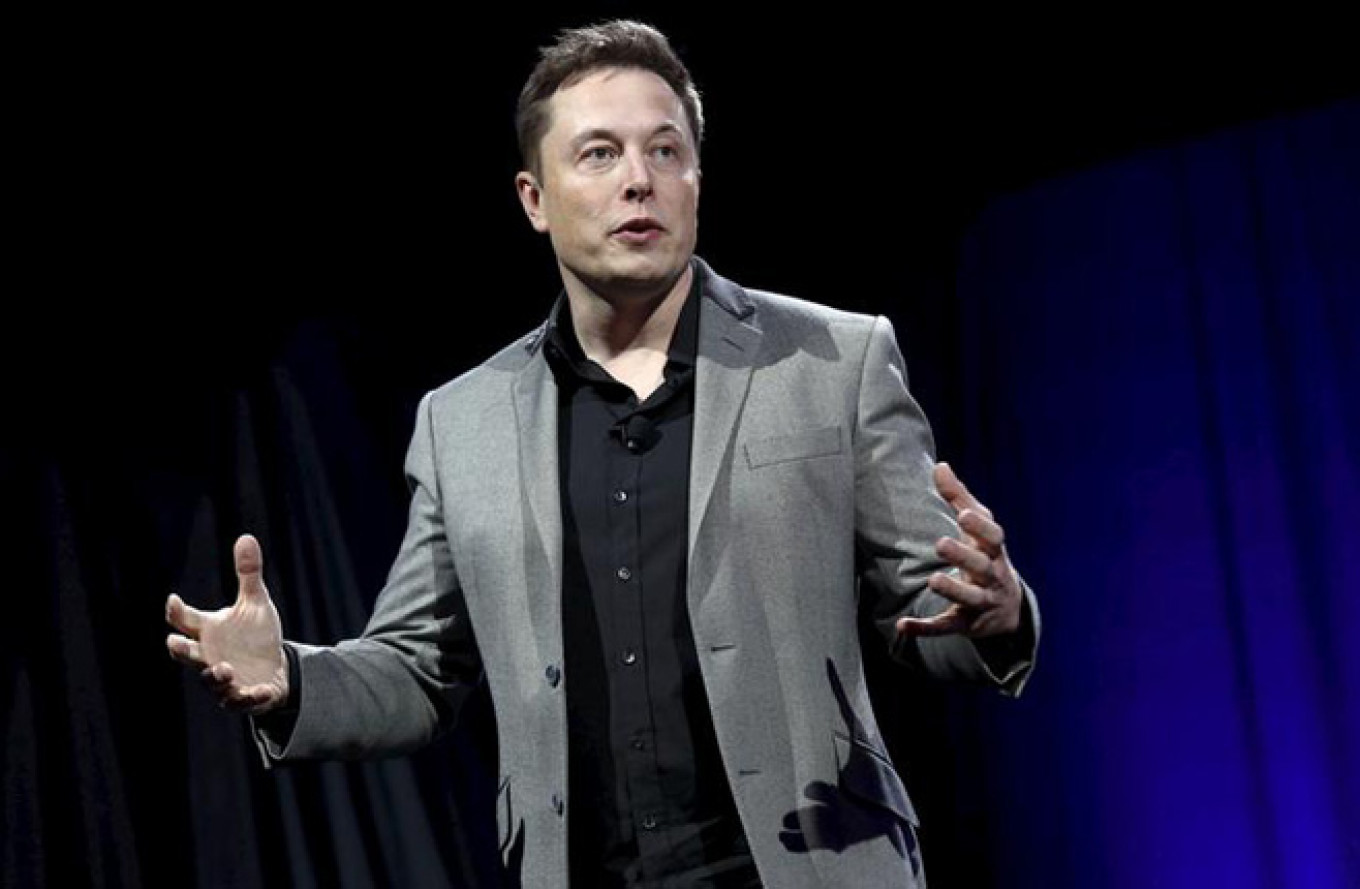
Sokolov says he will discuss the Jilin Hyperloop with China’s transport minister at a meeting in August and hopes “we’ll take the next step [in this project] together with our Chinese partners.”
Also, the Russian Direct Investment Fund (RDIF), a $10 billion state-backed investment vehicle, invested in Hyperloop One earlier this year. The amount was “very modest,” according to its chief, Kirill Dmitriev, But the RDIF also happens to run a joint investment fund with China worth $2 billion.
China is already helping to pay for a planned trans-Siberian high-speed rail line that could cost more than $200 billion. Hyperloop’s advocates say their technology be cheaper. According to Sokolov, the Jilin-Zarubino line will cost around 30 billion rubles ($450 million) — almost one-third less than a high-speed rail equivalent. “We must be serious about this idea,” he insists.
Where’s the Money?
But for all the enthusiasm, few in Russia are prepared to put down real investment just yet.
Hyperloop One is working “very closely” with the Transport Ministry, as well as local governments and “some of the largest Russian corporates,” says Shor. These reportedly include Russian railways and Gazprom, two giant state corporations. But these partners are contributing expertise and access, not money. All the cash is coming from Hyperloop One and Magomedov’s Summa, which Shor says has “invested quite a bit of resources, financial and otherwise.”
Even Putin, who in St. Petersburg promised support to Hyperloop One, wasn’t talking about financial support, his spokesman later clarified.
The problem is that while the Hyperloop concept is compelling, no one has yet worked out how to build one. Russia seems content to wait for the technology to prove itself with other people’s money.
The Local Contender
It might come as a surprise to discover that one of those working on the technology is Russian. Indeed, it turns out that Russian scientists were on to Hyperloop long before Elon Musk.
A century ago, before it was derailed by World War I, scientists in Siberia began working on a similar scheme, says Sokolov. Now, at St. Petersburg’s University of Transport and Communications, the project has been reborn.
Anatoly Zaitsev is an engineer who was briefly transport minister in the 1990s. At his lab on the Baltic coast, his team of around 20 people have equipment that can levitate transport containers. He says he could “absolutely” build a levitation track to Moscow, 650 kilometers away, if you give him $12 billion to 13 billion — significantly less than the cost of high-speed rail.
The only part of Musk’s plan Zaitsev says he hasn’t figured out is how to put his levitating pods in a tube. But that’s the simple part, he insists, “like dressing [the train] in a dinner jacket.”
Zaitsev thinks his technology is more developed than that of his rivals, whose plans remain mostly on paper. Both Shor and Sokolov praise his work. But despite that, Zaitsev is largely ignored by the ministers and local governments now courting Hyperloop One.
The reason why ultimately comes down to money. Hyperloop One has raised more than $100 million to fund research, pilot projects and investor outreach.
Another California company, Hyperloop Transportation Technologies, is also rubbing shoulders with big investors. One of its executives has said it is talking with a Russian private investor and is looking at Hyperloop projects in Russia. Its chief, Dirk Ahlborn, also met Putin in St. Petersburg in June.
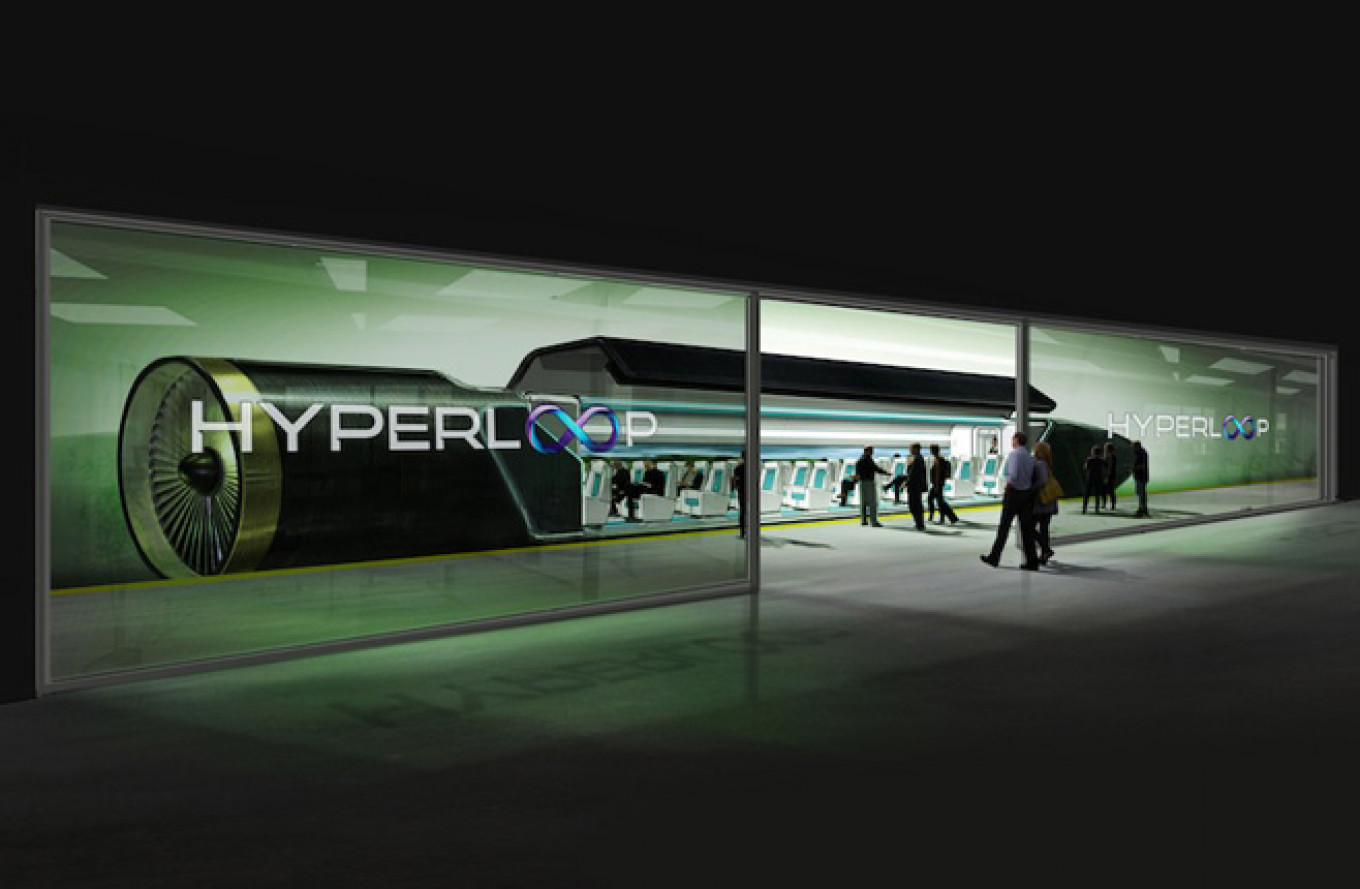
These companies can fund relentless global expansion, and they benefit from Silicon Valley’s sheen of success. Russian officials can engage with them at no cost to themselves. No wonder, Zaitsev laughs, that “when a foreigner shows up in Russia at the invitation of a resident billionaire, the music and dances start.”
“The Americans are better at getting money,” he says. “I tip my hat to Musk and his followers who so boldly and aggressively offer the world unfinished technology.” By contrast, Zaitsev has enough money to keep his lab operational, and not much more. If Hyperloop is eventually built, it is unlikely to be Russian-made.
Revolution?
But if Hyperloop really is the future of transport, and Putin jumps on board early, it could be a visionary move.
“Russia has a very good chance [of being the first place to develop Hyperloop],” says Shor. If the government acts quickly on regulation, he says it could happen in the next few years. That could put the country at the forefront of a transport revolution.
On the other hand, the whole thing could be a pipe dream. No one knows if the technology can be made cheaply enough to implement.
Russia, meanwhile, still lacks both money and many basics of a modern transport system, says Mikhail Blinkin, head of the transport institute at Moscow’s Higher School of Economics and an advisor to the Transport Ministry.
Fifteen years discussing high-speed rail has led to a single line between Moscow and St. Petersburg that travels less than 200 kilometers per hour. The country has only 5,000 kilometers of modern expressways, says Blinkin — less than tiny South Korea and not even enough to span Russia from east to west.
The government should focus more on practical improvements to the transport infrastructure and less on visions of Hyperloop tubes criss-crossing the country, says Blinkin. Otherwise, he adds, the officials cheerleading Hyperloop are just the latest versions of Marie Antoinette, the aristocrat who saw French peasants without bread, and supposedly said, “let them eat cake.”
A Message from The Moscow Times:
Dear readers,
We are facing unprecedented challenges. Russia's Prosecutor General's Office has designated The Moscow Times as an "undesirable" organization, criminalizing our work and putting our staff at risk of prosecution. This follows our earlier unjust labeling as a "foreign agent."
These actions are direct attempts to silence independent journalism in Russia. The authorities claim our work "discredits the decisions of the Russian leadership." We see things differently: we strive to provide accurate, unbiased reporting on Russia.
We, the journalists of The Moscow Times, refuse to be silenced. But to continue our work, we need your help.
Your support, no matter how small, makes a world of difference. If you can, please support us monthly starting from just $2. It's quick to set up, and every contribution makes a significant impact.
By supporting The Moscow Times, you're defending open, independent journalism in the face of repression. Thank you for standing with us.
Remind me later.


